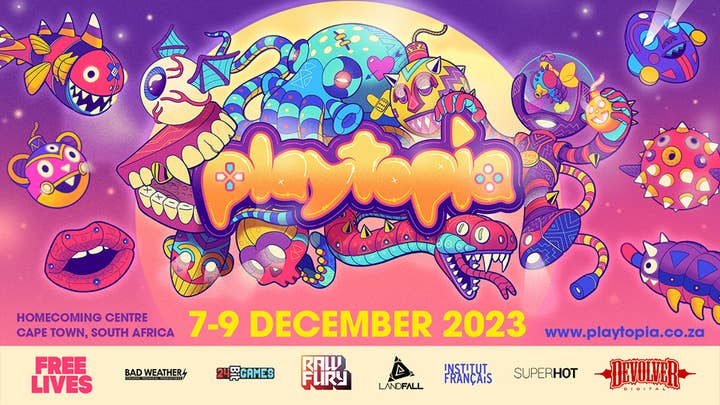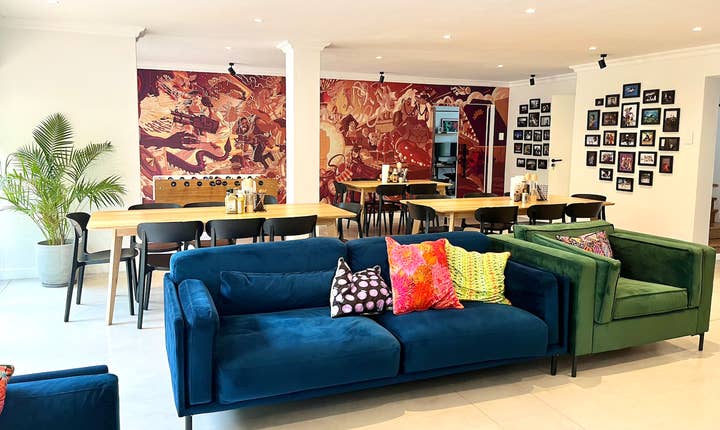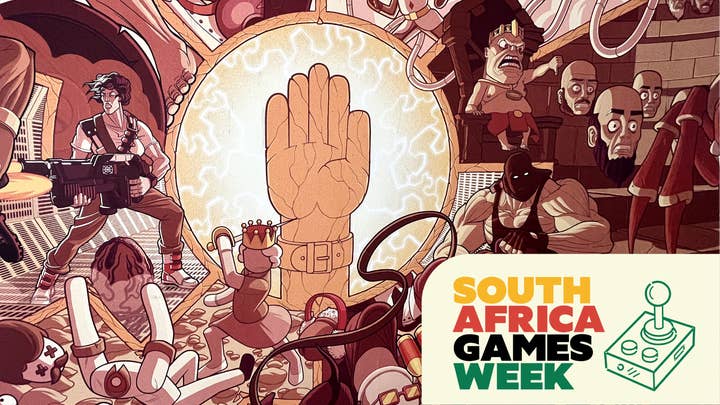A Broforce to be reckoned with
Playtopia, jams, workshops, meetups, funding: we chat to Dominique Gawlowski about Free Lives' success and how it's enabled it to take South African developers under its wings
You can read all our South Africa Games Week articles on this page.
Every single studio we talked to at Africa Games Week mentioned it at some point, and shared their own story of how the studio helped them, worked with them, or simply encouraged them: Free Lives is not only the poster child for the South African industry, but also undoubtedly a powerhouse in supporting all of those that have followed in its footsteps.
Finally meeting Free Lives managing director Dominique Gawlowski, we mention this status and what led the studio to be in this trailblazer position.
"The way we think about it is that it's unwanted attention but we understand that it's important and we've accepted that we are this to people in South Africa – so let's do everything we can to make sure that we give what we can give to bolster the local industry," she says.
"This was not something we set out to achieve. We set out to make good games and that was it. That was our only goal. And alongside that should I say, it was also to [create] a wonderful environment to work in. We've spent a great deal of time, effort, and money to break away from that mould that everyone thinks a business has to be, in terms of how it has to be run in order to make profits, which often comes at the detriment and the sacrifice of the employees."
Free Lives will celebrate its 12th anniversary this year, having been founded by Evan Greenwood in 2012 to develop what would become Broforce, originally a Ludum Dare project. Free Lives' debut title also marked the beginning of its relationship with Devolver, which has published almost all its games since then and "elevated the studio," Gawlowski notes.

"We've spent a great deal of time, effort, and money to break away from that mould that everyone thinks a business has to be"
After Broforce came Genital Jousting, which made a mockery of toxic masculinity, then Gorn VR, one of the very few games in its genre available when the Quest launched, and Cricket Through the Ages, one of the very first Apple Arcade titles. Free Lives has always managed to find sweet spots with its releases, getting into niches before the competition was too fierce.
Most recently, the studio briefly pivoted away from its usual satirical games to successfully release Terra Nil, a slow paced, environmentally conscious sim. And it should release two titles this year, Stick it to the Stickman and Anger Foot, which Gawlowski says are ''more in line with the usual Free Lives silliness."
"The studio is entirely self-funded, we don't take investment from anybody," she further explains. "We fund all our own projects. And we keep the team small-ish – if we grow it simply is because we are working on more than one game."
Going back to Free Lives' ethos when it comes to its working conditions, Gawlowski mentions it was "quite an adjustment" for her when she joined the company in 2019, originally as an in-house events producer following a successful career in the music industry.
"I have now learnt, unequivocally, that if you're good at what you do and it's going well, there's no reason why you cannot treat people more than fairly and decently," she says. "We have unlimited leave, we give everybody profit share in the company, we give each person one trip overseas to attend a gaming event of their choice, so that we stay connected with the community at large."
Staying in touch with the wider industry is particularly important to the studio because Free Lives also co-funds and organises Cape Town-based games event Playtopia, with Gawlowski also acting as festival director.
"It is very developer-focused," she continues. "It's primarily for the creators to gather and learn from each other. With the help of Devolver – who also funds the event alongside us – we were able to fly in African devs from Nigeria, Egypt, Tunisia and Kenya, with no strings attached. Just come and meet people, and attend talks and play games. Both African games and international games are shown so that there is a bar that is set. Because the young ones are coming, the next generation of developers, and we want them to see that this is what the standard can be, and shoot for this; you could be the game that does well."

Exposure to a wide array of games made internationally was recently improved at Playtopia thanks to a new section of the festival called Indie Planet.
"We were thinking to ourselves that South Africans and Africans are very financially geolocked to where they are, with the exchange rate being what it is, it makes it very difficult for us to travel overseas and attend different festivals.
"So we thought, why don't we bring the festivals to Playtopia? We chatted with Bitsummit in Japan and with Freeplay in Australia and we explained the problem that we face and [asked] how they would feel if we paid for them to fly to Cape Town, to represent their festivals. We do a talk on stage about what it's like being a gaming festival owner and what's going on in Japan, Australia, Germany, South Africa. And we exhibited the highlights of their festivals at Playtopia. So then local Playtopia festival goers had an opportunity to play indie games from their counterparts in those regions. It was absolutely amazing."
"South Africans and Africans are very financially geolocked... So we thought, why don't we bring the [international] festivals to Playtopia?"
Free Lives is also in the process of turning Playtopia, which has just held its third edition, into a non-profit organisation.
"It was started as a company because we didn't really know what we were doing and we were like, 'We just need this event, so we need to get a bank account' so we opened a company because that's just what you do! But now after some time, there is actually no point in this festival being a company. It should be an NPO because it will never make the kind of money to self subsidise – it needs donations throughout. It's the only way.
"Even if we sold out all the tickets it wouldn't even [cover] 10% of the cost of the event because there's a limit to what you can charge in South Africa. We can't charge €2,000 a ticket. No one will come. No one can afford that here. So to keep the ticket entry accessible to people here, we just eat it, you know? With Devolver's help, and the help of some others of our mates, like Landfall Games in Sweden, we just thought, 'let's just make it open that anyone that cares that this thing gets bigger and better can contribute'."
She shares the studio's ambition to "keep a very high standard at Playtopia," with the desire to showcase games made in Africa.
"It's still gotta be good though. And if you want to learn how to make good games, hit us back and we'll try and help you, be it with advice or connecting you with someone who can teach you, or workshops."

To say Free Lives is active on that front would be an understatement. From prototype grants (more about this in a tick) to meetups, the studio has several layers of support available to younger devs entering the South Africa games industry.
"We founded a community called the Maker's Massive. We've got a full time office in the city and we make it freely available to devs who want to have meetups of their own, that don't necessarily include us. They've got a space where they can do that. We host various game jams there, and every six weeks thereabout, we have a meetup of everyone in the Maker's Massive community, which is also a Discord channel, and people can sign up to give talks or submit topics that they would like addressed."
On top of all these various initiatives to support the local industry, Free Lives has also recently started a programme it calls the Jam Dole, which is a tweaked version of funding support it was already providing. The studio realised it was often approached to fund titles and would end up "giving oodles of money" for prototype making but, very frequently, "the prototype was never finished, the game petered out, or they lost focus."
"We don't care if it's not a game that ever gets made, we just want people practising and making [prototypes]"
"It was just sort of throwing money into this black hole that just wasn't coming back," Gawlowski highlights. "When we funded these games, there were no strings attached, but the problem is the games still weren't being made.
"So we've created a new system that we've been trying out which is called the Jam Dole. And you get 10,000 rands [roughly $530] for every prototype that you submit. And you get two weeks to make the prototypes. At the end of the two weeks, you have to have something on itch.io and playable. You do that and we'll give you 10,000 rands, no questions asked."
A lot of people we talked to at Africa Games Week back in December highlighted the challenge for local devs to turn ideas into prototypes, and then having the funds to develop that prototype further. Free Lives is essentially providing a safety net to be able to achieve this.
"We'd rather do it in steps rather than give this huge chunk of money to people who have not learnt what they need to learn yet or answered the questions they need to answer… but they still need to eat! And we don't care if it's not a game that ever gets made, we just want people practising and making [prototypes] so that they can be useful designers down the line, to themselves and to others.
"So we are just trying to alleviate that stress [so people] can actually sit down and know that they're getting paid to just work on their idea. And then we will take a hard look at it, sort of a couple of iterations down the line, and if they want to make it into a full game, we won't support that if we think it's going to be a bad game because that is just throwing good money [out].
"The No.1 motto at Free Lives is fail fast. We don't mind if you fail 20 times, just do that quickly"
"The No.1 motto at Free Lives is fail fast. We don't mind if you fail 20 times, just do that quickly, rather than spending three years and millions of rands on a bad idea. Just keep throwing up the ideas, throw it onto the internet – the internet will tell you if this is a good or a bad game.
"We'll give you 10,000 rands for each one, make five or six and then we'll sit down with those six with you and go right, 'Is there anything here that has potential?' And if it doesn't, we go 'Right, back to prototyping, start again!'"
While Free Lives doesn't always have the time for in-depth mentoring, Gawlowski says they always make sure to give quick feedback, even if just to say 'yes/no/carry on'. The Maker's Massive meetups are a good opportunity to reflect on these prototypes and chat with the teams more at length.
"All these little things will feed each other, the Jam Dole will feed the Maker's Massive meetups, where they can all be a bit more inspired to attend these talks when they're not actively making a game, to talk to other people who are also making games and making these prototypes.
"And then we're hoping that those prototypes will actually start to be developed into sort of longer length demos and games, that can then be submitted to Playtopia, where it gets exhibited and seen by top publishers."
Concluding our chat, we briefly talk about the challenges of South Africa as a country. But Gawlowski mentions that, while there are challenges, South Africa has a quality of life that is "unbeatable."
"There's a lot of right in South Africa, otherwise Free Lives wouldn't be here"
"There's a lot of right in South Africa, otherwise Free Lives wouldn't be here," she simply says. "If you can get going, it is very ideal to stay in South Africa, because if you're earning in dollars, and it's being translated into rands, you're empowering your studio even that much more, because of how terrible the rand is.
"Cape Town is beautiful, the weather's great, we are a country and a city that's really trying to fix things, make things better, bring more international business to Cape Town and better the lives of the people here. And I really want to be a part of that. I really want to contribute towards the gaming industry actually taking a notable foothold here. Free Lives is in a position to contribute towards that. The difficulties are that there's not enough funding from the government. But, I think we are working on that. And I think that local government is waking up to the potential of Cape Town being a games industry hub of Africa."
She concludes in a laugh: "As in… My emails don't go totally unanswered anymore!"
Sign up for the GI Daily here to get the biggest news straight to your inbox









